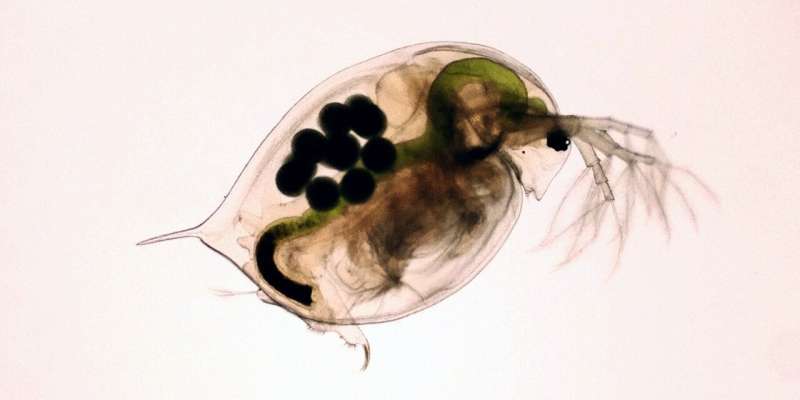Common sunscreen ingredients dangerous for freshwater ecosystems, says study

The active ingredients found in sunscreen have detrimental effects on freshwater ecosystems, according to new research by University of Alberta biologists.
The results show that long-term exposure to ultraviolet (UV) filters—including avobenzone, oxybenzone, and octocrylene—is lethal for some organisms living in freshwater environments. One of the largest sources of UV-filter contamination in both marine and freshwater environments is from sunscreen leaching off of the skin while swimming.
"We do know that UV filters are particularly devastating to coral reefs and cause bleaching, but there has been almost no research on what the effects are to freshwater animals," explained Aaron Boyd, graduate student in the Faculty of Science and lead author on the study. "To address this, we examined the effects of UV filters in the water flea, Daphnia magna."
The results show that exposure to UV filters over 48 hours prevented the fleas from navigating through their environment. Exposure over 14 days—similar to what might occur near popular beach areas—proved lethal for the tiny crustaceans.
"This is particularly bad for a freshwater ecosystem as a whole, as Daphnia are an important part of the food chain for many smaller species of fish," added Boyd, who completed the research in collaboration with graduate student Connor Stewart, under the supervision of assistant professor Tamzin Blewett and professor Keith Tierney.
"Losing a Daphnia population would put all of the species that rely on them at risk of starvation, and in certain conditions could cause the local ecosystem to collapse."
The good news, Boyd explained, is that the fleas were able to recover their ability to navigate through the water once the contamination was removed—a good sign for environmental recovery.
"These chemicals are short-lived in the environment, so if we remove the sources of pollution, then there is a reasonable chance for the organisms in those environments to recover," he said.
The scientists noted that further research is needed to better understand the long-term impact of UV filters, and to develop non-toxic UV filters.
The study, "A Burning Issue: The Effect of Organic Ultraviolet Filter Exposure on the Behavior and Physiology of Daphnia magna," was published in Science of the Total Environment.
More information: Aaron Boyd et al. A burning issue: The effect of organic ultraviolet filter exposure on the behavior and physiology of Daphnia magna, Science of The Total Environment (2020). DOI: 10.1016/j.scitotenv.2020.141707
Provided by University of Alberta



















